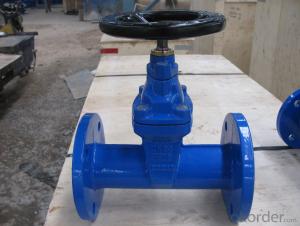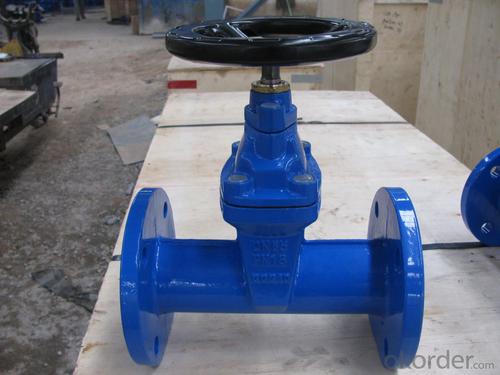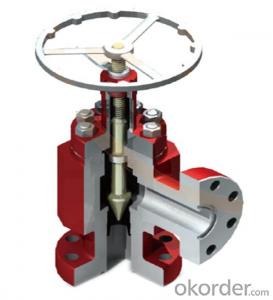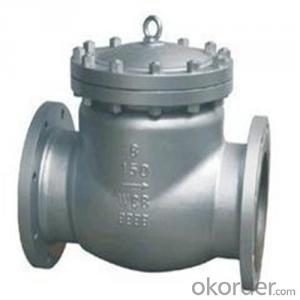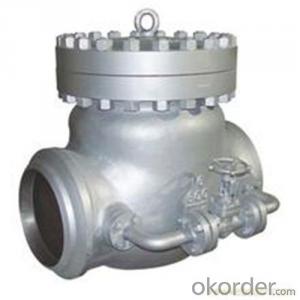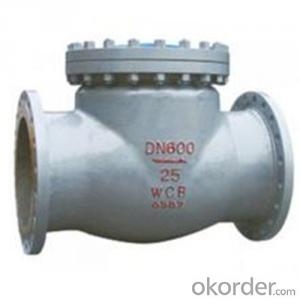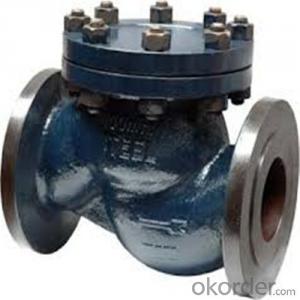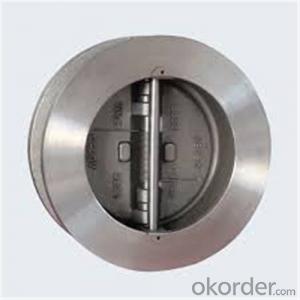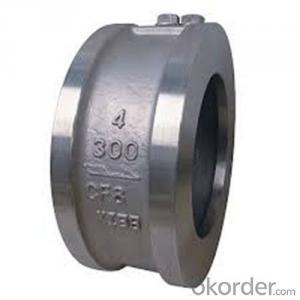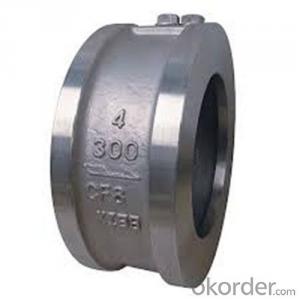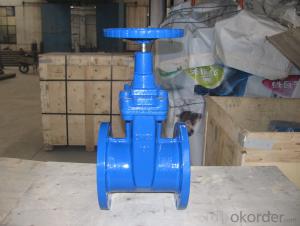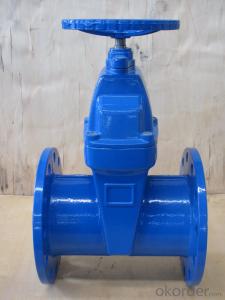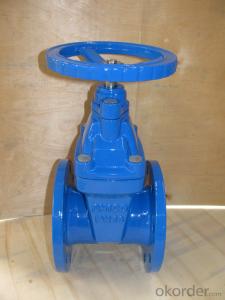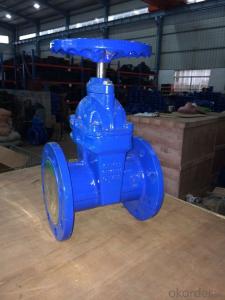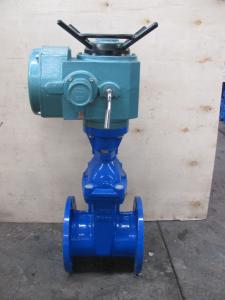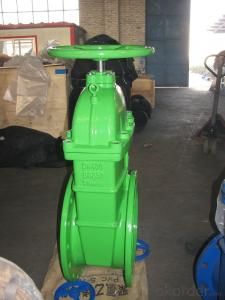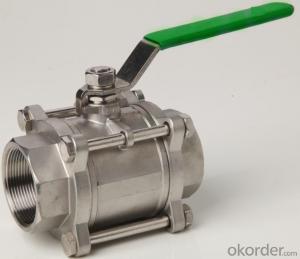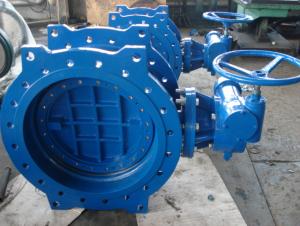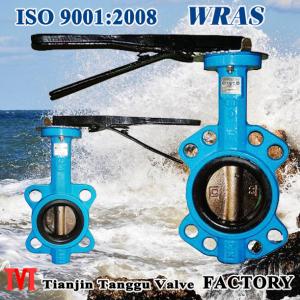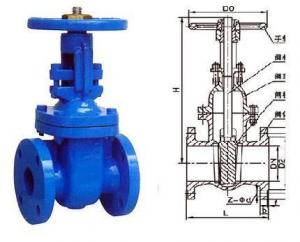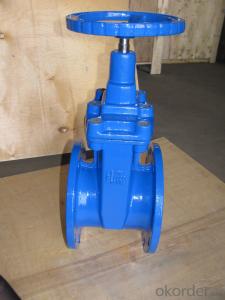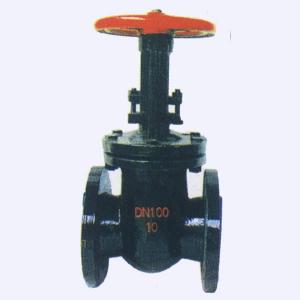Non-rising Stem Resilient Seated Gate ValveDIN3352 F5
- Loading Port:
- China Main Port
- Payment Terms:
- TT OR LC
- Min Order Qty:
- -
- Supply Capability:
- -
OKorder Service Pledge
OKorder Financial Service
You Might Also Like
Type: | Non-Rising Stem |
Material: | Body: Cast Iron / Ductile Iron Wedge: Cast Iron / Ductile Iron Encapsulated with EPDM Seat: EPDM / NBR Shaft: SS410 Stem Nut: Brass O-ring: EPDM, NBR Wedge Nut: Brass / Bronze Hand Wheel: Ductile Iron
|
Operator: | Hand Wheel / Bevel Gearing / Square head / Electric actuator |
Face to Face: |
BS5163: 1986, DIN 3202 F4-F5, JIS B2002, ANSI B16.10
|
Flange: | BS4504, DIN 2532, JIS B2212, ANSI B16.10/ANSI B16.50
|
Working Pressure: | 16 Bar(200 PSI) |
Design and Manufacturer Standard : | BS5163, DIN 3352, JIS B2043 |
Test Standard: | API 598 BS6755 DIN 3230 JIS B2003 |
Application: | Water works, Sewage, Public facilties, Building industry, Petroleum, Chemical, Steel, Metallurgy, Paper Making Industry, Foods, Beverage, HVAC |
| | | | ||||||||
| | | | ||||||||
| | | | ||||||||
| | | | ||||||||
| | | | ||||||||
| | | | ||||||||
| | | | ||||||||
| | | | ||||||||
- Q: what would happen if valve was not adjusted right? and please explain
- it could make a hole in your piston
- Q: So just yesterday i bought a second-hand ytr 2320e. After i bought it, i washed it and tryed playing it, but when i press the first valve, there is this small metal scraping metal sound kinda like if you scratch a metal bowl with a fork. I think it has something to do with the spring but im not sure.also, i was wondering if the trumpet valves are supposed to be very easy to press, or if they take a tiny bit of push.
- I don't think anyone knows, because there's multiple Bibles. And people interpret it their own way, and re-print it with different scriptures. As far as I'm concerned, there is no such thing as a REAL bible anymore. And any beliefs we have today about it are all false. According to one bible, you will be sent to hell on both counts. According to a modern version, you will be excused for doing your wife, and in another bible, you'll be stonned for asking this question (Knowledge is a sin) Interesting that we are the only intelligent life on earth, supposedly made in God's image, and yet the bible says to stay away from the tree of knowledge. Sorry, I don't buy into that bullcrap.
- Q: Water has been seeping out of the sprinklers closest to the anti-siphon valve. Water seeps out of the sprinkler even when the anti-siphon valve is manually closed and not connected electronically. I opened up the anti-siphon valve to inspect the diaphragm, but there is no debris nor it was damaged. To be sure, I switched the diaphragm chamber of the two anti-siphon valves (a suspected leaky one and another good working one), but leak persists from the same sprinklers. I think the leak is from the (float?) rubber seal at the bottom of the stem closing the inlet valve. My anti-siphon is a Hardie (or Irritrol) model 311A series.1) Is my troubleshooting and logic correct? What other components could have contributed to the leak described? 2) At what scenario will water be flowing out of the anti-siphon cap?3) How can I determine if my anti-siphon valve has a vacuum breaker? What is a vacuum breaker good for?4)Which brand makes the most reliable anti-siphon valve?
- If the antisyphon valve is not leaking maybe you should focus attention on the main valve ( assuming it is a solenoid valve) to see if it closes completely. Another thing, if the irrigation zone is on an incline then the water in the system will drain to the lowest point. Sometimes it drains slowly causing the impression of a leaky feed valve.
- Q: 12 valve
- Un plug the vacuum hose on top of the valve, loosen and remove the big tube nut on the bottom of the valve, I have found if you hit it sharply with a hammer 3 or 4 times before you try to loosen it won't break the valve off, once the tube nut is undone remove the 2 bolts holding the EGR valve to the intake manifold. Remove and discard the gasket and install the new valve in the reverse order. If the tube nut still won't come loose try heating it with a torch, if it's really rusted on you might have to replace the EGR tub along with the valve.
- Q: how do i adjust the valve lash my book sys to torque to 136 in lbs but my wrench is only in ft lbs
- valve lash is a small gap between the rocker arm and the valve stem as the engine heats up the gap gets tighter due to expansion of valve train parts. To set the lash correctly find the gap that is recommended and use a feeler gauge to set. loosen the jam nut that holds the adjustable screw and set the screw to point where the guage has a slight drag on it. all this is done at the rocker arm and takes practice to get the feel of it. This must be done while the valves ARE CLOSED and the engine rotated to the correct position for that cylinder. Once the gap is set using the feeler guage, hold the adjustable screw still and tighten the jamb nut to the in./lbs. speced. In./lbs are a smaller value than ft/lbs. Find a torque wrench that has the smaller increments. If your not sure, find someone who HAS done this before and get them to assist you. Again, it must be done with the engine rotated to the correct spot. Usually around TDC for that cylinder being adjusted. Once set, test again with the feeler guage and see if the lash changed during the tightening of the jamb nut. If so, set again till lash has a slight drag. This means that you can slide the feeler guage in the gap and its not to loose nor to tight
- Q: What are the benefits of changing new cylinder heads and exhaust valves in the Main engine of the vessel? I am now studying a vessel which has a problem with their main engine. Frequent repair of cylinder heads (they usually weld it) and exhaust valves are the ones they do. I need to further give the benefits to be submitted to the vessel's management for them to buy new cylinder heads and exhaust valves as a replacement for the welded ones.
- The only reason to change out a cylinder head is because the exhaust valves have been burnt or the valves in general have been used to a point they don't seat any longer. Which means the engine compression to fire the cylinders on compression stokes is too low to be efficient to operate. Or the cylinder head has a crack in it and leaks water or the compressed gasses from the engine compression blow into the water jacket through the cracks causing the coolant to blow out and the engine to overheat.
- Q: Recently, my best friend told me that he has tricuspid valve disease. So basically, the tricuspid valve in his heart is leaky and doesn't close tightly, allowing the blood to flow backwards.I just have a few questions about it and i don't wanna ask him because he doesn't like talking about his condition and i don't wanna make him uncomfortable. I just wanna know, is there any risk on his life or will he be able to live his life normally?Also, he doesn't take good care of himself at all. He completely ignores his condition. So i need to know, what should he avoid doing? Maybe I can prevent him from doing all the things that could hurt him. Most of all, i wanna know if there is anything I can do to help him.Guys if there's anything you can tell me, then please do. He's like my brother, we've been best friends since 1st grade and now we're both 16. I just want him to be okay.
- Tricuspid valve disease refers to abnormal function of the tricuspid valve. Two types of tricuspid disease include: Tricuspid regurgitation - the valve is leaky or doesn't close tight enough, causing blood to leak backwards across the valve Tricuspid stenosis - the valve leaflets are stiff and do not open widely enough, causing a restriction in the forward flow of blood. Your physician may refer to this as an increased pressure gradient across the valve, found by echocardiogram or cardiac catheterization. How is it treated? Medical Management Your doctor will want to monitor the progress of your valve disease with regular appointments. They may be spaced once a year or more often, if your doctor feels you need to be followed more closely. Your appointment will include a medical exam. Diagnostic studies may be repeated at regular intervals. Your physician may prescribe medications to treat your symptoms. These medications may include drugs to treat heart failure or medications to control irregular heart rhythms. Lanyard and template handle assists with placement of ring Surgical Management Tricuspid Valve Repair When valve disease is severe, it may be necessary to repair or replace the diseased valve. Tricuspid valve repair using an annuloplasty ring is the preferred surgical approach for tricuspid regurgitation and may be performed for primary tricuspid disease or for combined cases with other valve surgery (mitral, aortic). See illustrations to the right. For more information and to view actual surgery, see: Movie: Edwards MC 3Tricuspid Annuloplasty* NOTE: Son, these patients are depressed, so they avoid discussing their condition.So the best way keep them happy as if nothing is wrong with them.OK Hope it helped you out. G/Luck.
- Q: I'm a 68 year old male. i've had mitral valve regurgitation all my life . recently an echocardiogram listed it as 3 plus. I'm in otherwise good health and continue to jog 3 miles three times a week at about a 9 minute mile rate. Is surgery advised.
- Have you asked your Cardiologist this question as well as your Primary? I do not know what the reading indicates...sorry!
- Q: i have a leaky tp valve on my hot water boiler. The valve is rated at 30 psi and 155,000 btu. I can't find one with that btu rating. will a higher rating work?
- Don't go by the the old valve, look at the specification tag on the boiler. Do not exceed the temp or pressure rating. If you do, you will only create a time bomb and a big one at that. In no circumstances should you use a valve with a higher rating than the heater!
- Q: like my Acura has a 16v 4clyinder engine , and i dont know what valves does , the more vavles the faster?
- Your engine is essentially like a vacuum cleaner only it pulls in filtered air that mixes with filtered gasoline. The valves let the fuel/air mix into the cylinder on the piston down stroke or intake stroke. The cylinder actually draws the fuel/air mix in and then compresses it with all valves closed and then it fires driving the piston back down on the power stroke. Coming back up the piston pushes the exhaust gases out through the open exhaust valves. They discovered that there is less resistance with more valves verses trying to make one or two really big valves. In older cars there were only two valves per cylinder. The intake valve was bigger than the exhaust valve but not by much. With four valves per cylinder, the piston uses less energy to draw the fuel/air mix in and push the exhaust gases out. Better effieciency equals more miles per gallon and more horse power when compard to an engine the same size with only two valves per cylinder. Good Luck!
Send your message to us
Non-rising Stem Resilient Seated Gate ValveDIN3352 F5
- Loading Port:
- China Main Port
- Payment Terms:
- TT OR LC
- Min Order Qty:
- -
- Supply Capability:
- -
OKorder Service Pledge
OKorder Financial Service
Similar products
Hot products
Hot Searches
Related keywords
